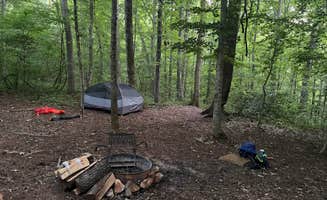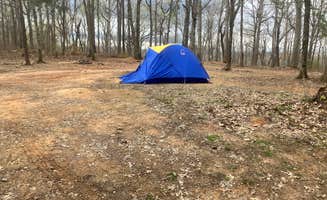Dispersed camping sites near Colfax, North Carolina provide tent campers and backcountry enthusiasts access to the rolling terrain of the eastern Piedmont region. The area sits at elevations ranging from 500-900 feet with oak-hickory forests dominating the landscape. Most free camping near Colfax requires visitors to bring all necessary supplies including water, as potable sources are not available at primitive sites.
What to do
Trail exploration on foot: The Birkhead Mountain Wilderness Area Dispersed offers trail networks for hikers seeking solitude and primitive camping. One camper noted, "Very nice trails. Well maintained. Not marked the best... signs at intersections. Plenty of creeks. Hike in for dispersed camping."
Wildlife observation: Early mornings provide optimal wildlife viewing opportunities at most dispersed sites in the region. At Robbins Branch Trail, campers can access wooded areas where deer, wild turkey, and various bird species are commonly spotted during dawn hours.
Water activities: During warmer months, sites near water bodies offer fishing and wading opportunities. Bring appropriate gear and check local regulations for fishing licenses. Water levels fluctuate seasonally, with spring typically providing the most reliable access to streams.
What campers like
Natural soundscapes: Campers consistently mention the peaceful acoustic environment at Shallow Ford Natural Area. As one visitor remarked, "This campsite is on the Mountains to Sea Trail for those that are doing that. There's lots of shade and it is very peaceful. It is pretty flat for your tent and there are fire rings."
Solitude and privacy: Most dispersed camping areas near Colfax feature well-spaced sites that minimize contact with other visitors. This creates opportunities for stargazing and quiet contemplation away from light pollution and crowd noise.
Level tent sites: Finding flat ground for tents ranks as a common concern among campers. Dispersed Camping off Falls Dam Trail addresses this need, with one camper reporting, "Had a good time camping and enjoyed the song of wind and birds."
What you should know
Water planning required: Pack in all drinking water as none of the dispersed sites provide potable sources. The nearest reliable water access is typically in surrounding towns like Colfax, Greensboro or Winston-Salem.
Fire regulations: While most sites permit fires in established rings, temporary bans may be implemented during dry periods. Check with local forest service offices before trips, especially in late summer and fall when conditions are driest.
Cellular coverage: Signal strength varies significantly throughout the region. Most campers report spotty or no coverage in wilderness areas and along deeper ravines. Consider downloading offline maps before departure.
Seasonal considerations: The Piedmont's humid climate means insect activity peaks from May through September. Winter camping is possible with proper gear, though temperatures can drop below freezing from December through February.
Tips for camping with families
Choose accessible sites: For families with young children, Shallow Ford Natural Area offers relatively short hikes to camping areas. The terrain is manageable for elementary-age hikers, with established fire rings already in place.
Wildlife education opportunities: Bring field guides to identify common Piedmont plant and animal species. The oak-hickory forests support diverse ecosystems that can provide natural learning experiences.
Pack extra supplies: With no facilities at dispersed sites, families should bring additional water, waste bags, and weather-appropriate clothing. Temperature swings between day and night can be significant, particularly in spring and fall.
Tips from RVers
Size limitations: Most dispersed camping areas near Colfax restrict access to smaller vehicles or require hiking in. For RV camping options, Dispersed Camping off Falls Dam Trail provides limited drive-in access for compact rigs under 25 feet, though amenities are nonexistent.
Road conditions: Access roads to dispersed camping areas are typically unpaved and may become challenging after rainfall. High-clearance vehicles are recommended, especially for reaching more remote free camping near Colfax, North Carolina.
Self-contained requirements: All RV campers must pack out waste and bring sufficient water supplies. No dump stations or water fill locations exist at primitive sites, so plan trips according to your tank capacities.



